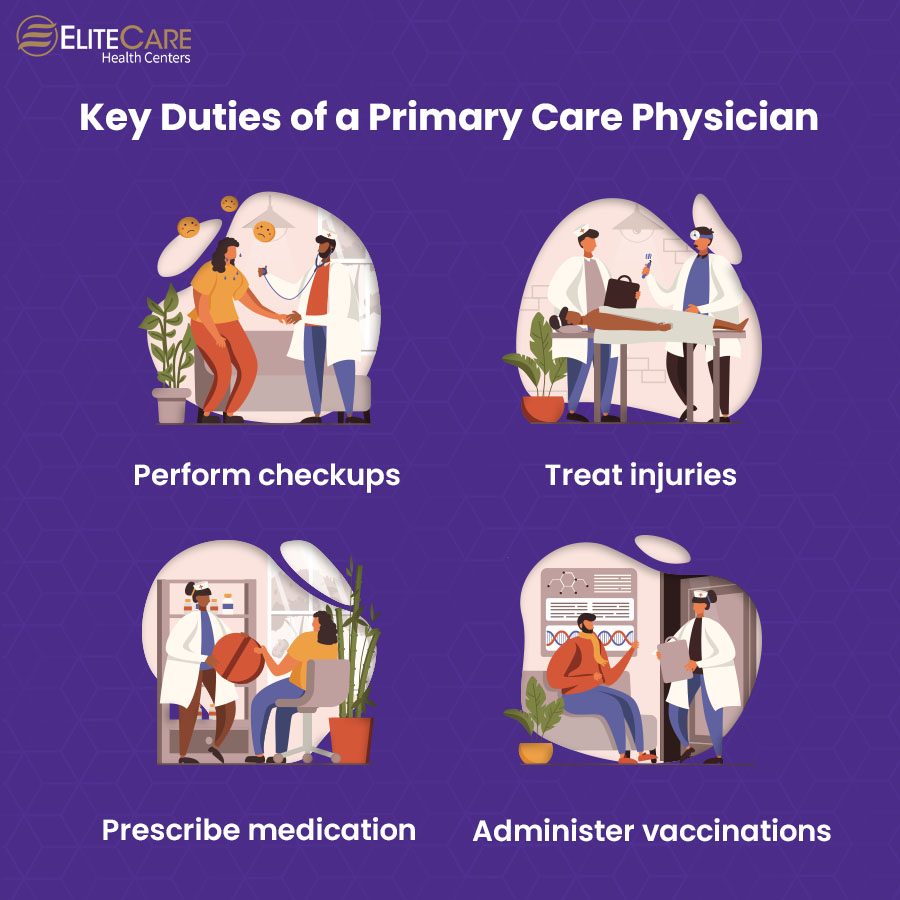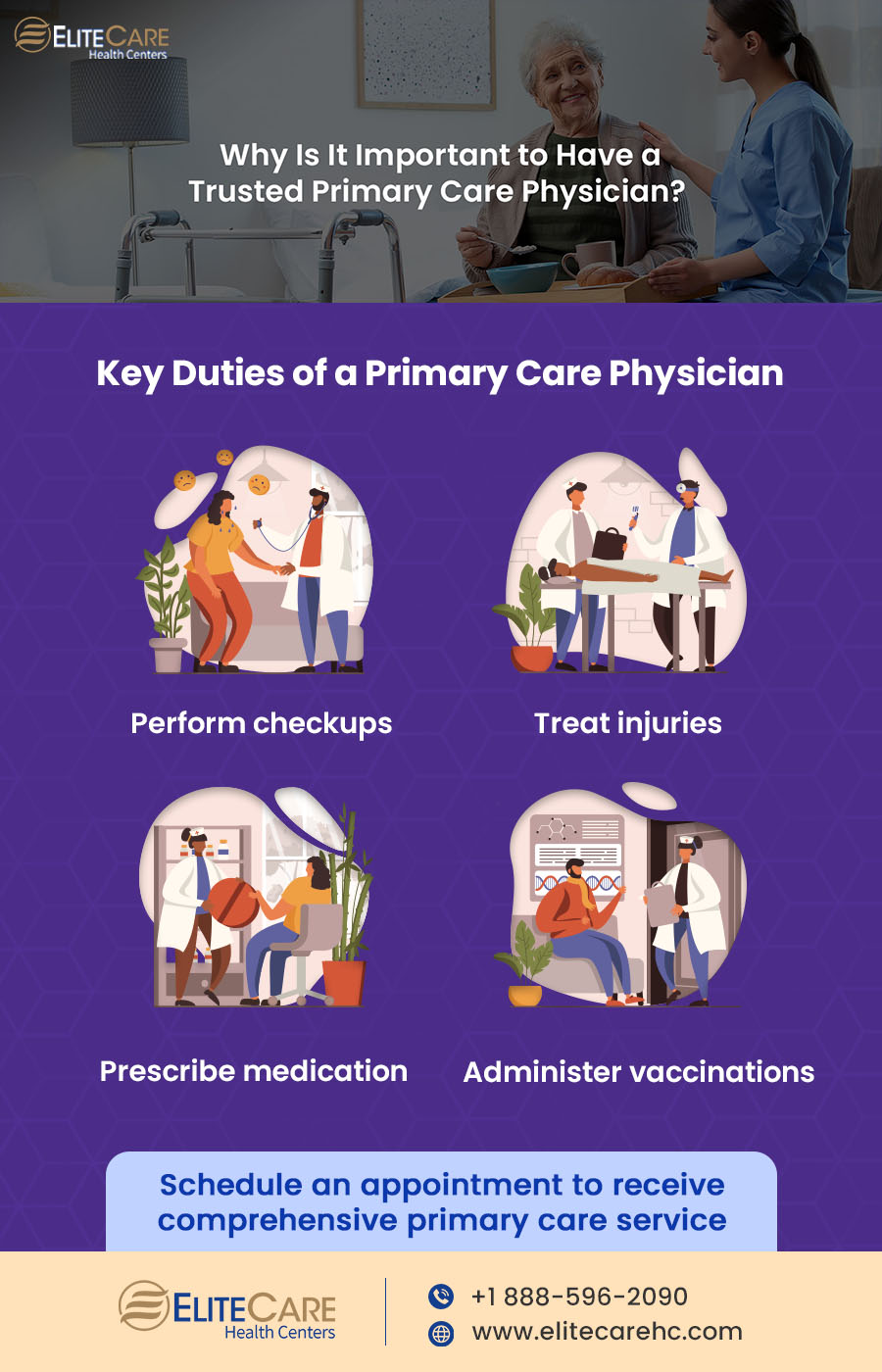
Primary care physicians (PCPs) are the cornerstone of our healthcare system. They are mostly the first point of contact for patients seeking medical attention and are responsible for diagnosing and treating a variety of acute and chronic conditions. PCPs also play a crucial role in preventative care and managing overall health and wellbeing. In this blog post, we will explore their various responsibilities and the importance of having a trusted PCP on your healthcare team.
Key Duties of a Primary Care Physician

Perform Routine Checkups & Screening
Primary care physicians play a crucial role in providing routine checkups and preventive health screenings to their patients. As part of these screenings, PCPs will assess a patient’s blood pressure, cholesterol, and blood sugar levels. If any of these levels are elevated, they may recommend lifestyle modifications or prescribe medication to manage them effectively.
Additionally, depending on a person’s age, gender, and medical history, they may perform routine screenings for breast, cervical, and colorectal cancer, among others. By identifying potential health risks early on, physicians can help patients mitigate the risk of developing challenging health conditions.
Routine checkups also provide physicians with an opportunity to assess a patient’s overall health and well-being. During these checkups, they may discuss topics such as diet, exercise and smoking cessation in order to improve the patient’s overall quality of life.
Treat Injuries & Infections
Primary care physicians are responsible for diagnosing and treating acute illnesses and injuries. These can range from common colds and viral flu to more serious infections like strep throat, pneumonia, and urinary tract infections. Physicians often conduct a thorough physical examination before ordering laboratory tests to determine the nature and severity of the condition. Additionally, they frequently treat minor injuries such as sprains, strains, and bruises that occur due to accidents or falls. In such cases, they may first perform a physical exam and then order imaging tests like x-rays to diagnose the extent of the injury.
PCPs are also trained to provide temporary relief for serious conditions that require immediate medical attention like appendicitis, fractures, and lacerations. If a patient presents with symptoms that require specialized care or emergency intervention, the physician will refer them to a specialist or emergency department for further evaluation and treatment. By providing comprehensive care and making appropriate referrals, physicians ensure that their patients receive the best possible treatment for their health problems.
Prescribe Medication
Ongoing medication management is often required for chronic conditions like diabetes, high blood pressure, hypertension, heart disease, etc. In these cases, PCPs will prescribe medicines to manage these conditions and make necessary adjustments to dosages. They also work closely with their patients to modify treatment plans, ordering laboratory or diagnostic tests as needed.
In addition to prescribing medications, PCPs are responsible for managing prescriptions for their patients. They ensure that patients are taking their medications as prescribed and monitor for potential drug interactions, side effects, or allergic reactions. Before prescribing a new medication, physicians typically review a patient’s medical history, including any previous adverse reactions to medications.
Administer Vaccinations
Vaccinations are one of the most effective ways to prevent infectious diseases and their complications, and PCPs are responsible for ensuring that their patients receive the recommended vaccines at the appropriate times. PCPs provide vaccinations for both children and adults based on their age, health status, immunity and other factors.
For children, the vaccination schedule includes protection against diseases such as measles, mumps, rubella, pertussis, polio, etc. Adults may be recommended vaccines for illnesses such as influenza, pneumococcal disease, shingles, and hepatitis A and B.
PCPs are also responsible for keeping accurate records of their patients’ vaccinations and ensuring that they are up to date on their recommended vaccines. This includes providing patients with copies of their vaccination records and reporting vaccine administration to state and local health departments as required by law.
In addition to the duties mentioned above, primary care physicians are also responsible for the following:
- Provide mental health services, such as diagnosis, treatment, follow ups or referrals for depression, anxiety, and other mental health conditions.
- Manage women’s health issues such as contraception, pregnancy and menopause-related health problems.
- Perform minor procedures like mole removal, skin biopsies, removal of ingrown nails, etc.
What Are the Benefits of Having a Trusted PCP?
Continuity of Care
When a patient has a PCP that they trust, they are more likely to see the same provider consistently over time. This allows the physicians to develop a deeper understanding of the patient’s health history, lifestyle, and specific health needs. With this knowledge, they can provide personalized care, tailored to the patient’s unique needs and preferences.Security & Reassurance
When patients have a regular provider who knows their medical history, they are more likely to feel comfortable discussing sensitive health issues, seeking advice or guidance, and asking questions. This can lead to better health outcomes, as patients are more likely to follow through on recommended treatments and preventive measures.Better Coordination
PCPs play a vital role in serving as a patient’s advocate and the main point of contact. They can help patients navigate the complex healthcare system by coordinating with other healthcare providers and specialists as needed. This collaborative approach can help to ensure that patients receive comprehensive and well-coordinated care that addresses all their medical needs. Moreover, patients who have a trusted PCP tend to have better health outcomes, including lower rates of hospitalization and fewer complications from chronic conditions. They are also less likely to visit the emergency room. Therefore, by working collaboratively with their PCP, patients can take a proactive approach to managing their health and significantly reduce their risk of developing various health complications.Conclusion
Primary care physicians play a very important role in the healthcare system. From diagnosis and treatment to disease prevention and health promotion, they are always on the front line of healthcare delivery. Researchers have found that communities with access to primary care physicians experience fewer deaths from all causes. Additionally, patients who maintain regular contact with a primary care provider can reduce their healthcare expenses by up to 33% compared to those who rely exclusively on specialist care. These findings emphasize the significance of having a trusted primary care physician and the importance of establishing a long-term relationship with one to prioritize preventative care and achieve overall good health.
If you or your elderly loved one need primary care services from a team of experienced and dedicated primary care physicians, visit the nearest EliteCare Health Centers clinic for more help. EliteCare is one of Florida’s best medical clinics, with a team of highly professional PCPs who offer services like venipuncture, immunizations, EKG and more. Visit their website to schedule an appointment today.






